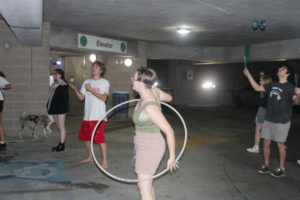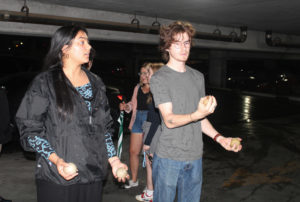The question “Where am I?” can mean many different things. There is, of course, the prototypical “Dorothy in Oz” version of the question provoked by unfamiliarity with a new environment. There is also the philosophical variant which suggests an existential or metaphysical disorientation, especially when emphasis is placed on the “I.” Finally, there is a related form that might be paraphrased as “How on Earth did I get here?”
When I stood on top of the Diboll Parking Garage at sunset in the middle of a troupe of bubble-blowers, plate-spinners and unicycle-riders, at least one of these versions of “Where am I?” passed through my mind.
Let me retrace my steps.
A few weeks ago, I received a message from the Juggling Club’s Minister of Sensations, Dan Myers, asking if I would be interested in writing an updated profile of the organization. If you are not familiar with the club, its full title — The Benevolent Society for the Propagation of Assorted Tomfoolery and Other Sorts of Peculiar and Otherwise Absurd and Baffling Nonsense — might provide a better indication of its vibe.
They have almost as many initiatives as their title has words. Some of their antics include upkeeping the campus gardens, offering free bike repairs, putting on large-scale public games and organizing free-ish communal meals. As any club insider would make clear, however, the full breadth of their activities goes far beyond my basic characterization, or perhaps even beyond my comprehensibility.
I have found that mentioning the club’s name to the wider population of Tulane students often elicits a smirk that suggests being mutually privy to something. The Juggling Club is notorious for its mystery, among other things — its reputation could be more derogatorily stated as being a group of weed-smoking, neo-hippies. But this is precisely the reputation that the ministers of the club are trying to change, hence the message I received. It was telling that it arrived via GroupMe and not a cryptic note shoved under my door, as I might have expected from a secret society.
On Sunday, the day before the parking garage revelry, I asked Myers about the possibility of sacrificing the club’s secrecy for a new public image when I met him and some other jugglers in the Wall Residence Hall garden.
“We’ve actually been talking a lot about this,” Myers said. “There is definitely an air of mystery that we do cultivate, and it’s intentional … It’s a silly club. It’s meant to be whimsical and absurd.”
Again, I was struck by his transparency. As we sat on the porch of the shed, I peeked inside the open door for the first time. The shelves were filled with sundries: old sun-dried books, kites, a parachute, a tire pump and bins with unknown contents. People wandered easily up to the shed, loitering for a while in its shade and sometimes juggling a bit. One member called out “Love all of you!” as she swung around a post on the porch, then wandered off.
This brings me to Monday evening, and specifically, to the base of the elevator in Diboll next to a guy straddling a bike. When the doors opened and he pressed the six button, I sensed a kind of tacit recognition between us. As soon as the doors reopened, he took off, leaving me alone on the roof.
It was drizzling almost imperceptibly. The lights shining on the adjacent field and the diffuse glow of the setting sun made the mist real at the same time as it made it more silent. This was when the first “Where am I?” passed through my mind.
I turned around, and as if on cue, a dog ran up on the car ramp. Then there was the polka music, which steadily increased in volume as a loose band of about 20 revelers climbed up. Among them was Myers, hauling a sack of toys and other tomfoolery-related items that the jugglers cracked into once he laid it down.
My immediate impression was that everyone knew the drill: a group of hula hoopers formed in one corner, a group of Rubik’s Cubers in another and, of course, the jugglers in another. My second “Where am I?” was voiced aloud, laughing, as I approached the group with a friend who had run over to greet me.
There were some initial concerns about the camera I had hung around my neck, causing some ministers to hastily consort out of earshot, but ultimately they concluded that I would be permitted to enter the fray.
“You’re going to be doing some hands-on journalism tonight,” Myers said, as he placed some juggling balls in my hand and a cohort gathered to teach me — the juvenile juggler that I am.

In a sense, the club is exactly as its name advertises. It is also a highly heterogeneous mixture of people, activities and symbolisms — the soundtrack of the night featured songs by The Beatles and the Grateful Dead, as well bouncy circus tunes and a sea shanty. When I asked a club member if there was a playlist, he responded that songs were queued spontaneously in accordance with the vibe. When I asked how one could identify a juggler among other Tulane students, the answer was the same: vibes.
If I had to describe it, the vibe would be something like gypsy/pirate/circus clown core.

In search of what makes the group coherent, I set out to uncover the club’s mythology. Roughly 18 years ago, the founder of the club wrote a book titled “The Impractical Cogitator,” which is a kind of manifesto or bible that gives the club its philosophical foundations. Some club members believe in a disembodied spirit named “Gregory Gregory,” who embodies the club’s values and lurks just behind every juggler’s shoulder. There was also some business about intergalactic gnomes who ride on radio waves, though this lore was described as “unsanctioned.”
What truly ties the Juggling Club together is what it is not, which is to say, Greek life. To my surprise, members of the club were explicit about their anti-Greek life stance. While they would never turn away anyone in a fraternity or sorority, they are in principle against the organizations because of the competitive, inauthentic and otherwise toxic communities that they foster.
The Juggling Club’s solution to what they perceive as Tulane’s social problem is marked by either willful denial or hope, depending on which communities on campus you are part of. Namely, they offer a transient return to a simpler time — childhood — when authenticity was not a choice, play was without real consequences and friendships were formed upon mere collision. As I watched the absurd scene from the distance of the elevator corridor waiting to descend, I knew that I had glimpsed something special. What I felt then — elevator doors opening — was not so much the disorientation of “Where am I?” but what the poet Ross Gay defines as delight: a small softening in a world that tries to harden us.
I think Myers and the other ministers of the club have realized the potential of their organization and, for the first time, are ready to open their doors a little. This is not an advertisement of the Juggling Club per se, as a large part of me wants to leave it undisturbed in its mystery. So let’s call this a proposal. As Ross Gay notes, the word “delight” suggests being “of light” and “without light” at the same time. I believe that benevolent tomfoolery, play or juggling in the almost spiritual sense that the club uses the term stems from a similar kind of suspended impossibility. It isn’t hard to find three small, round objects lying around … why not give it a whirl?



